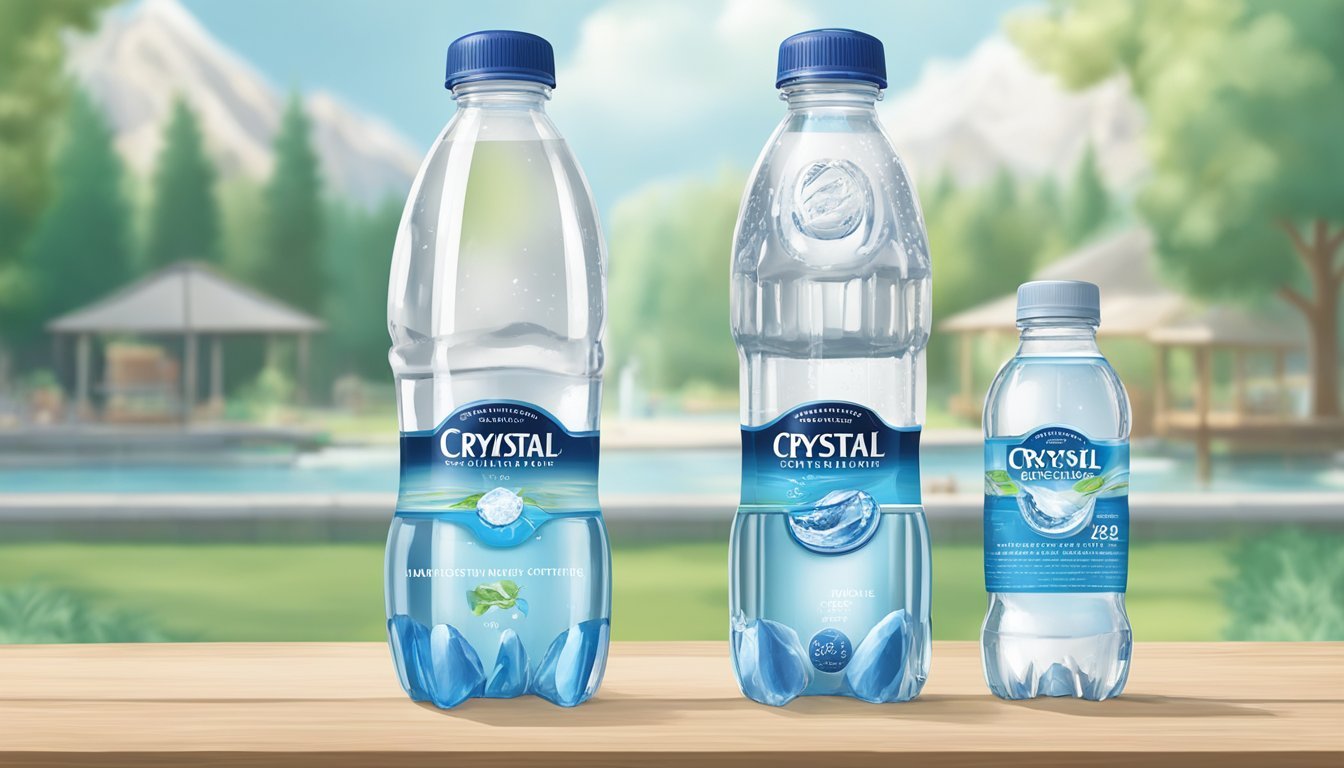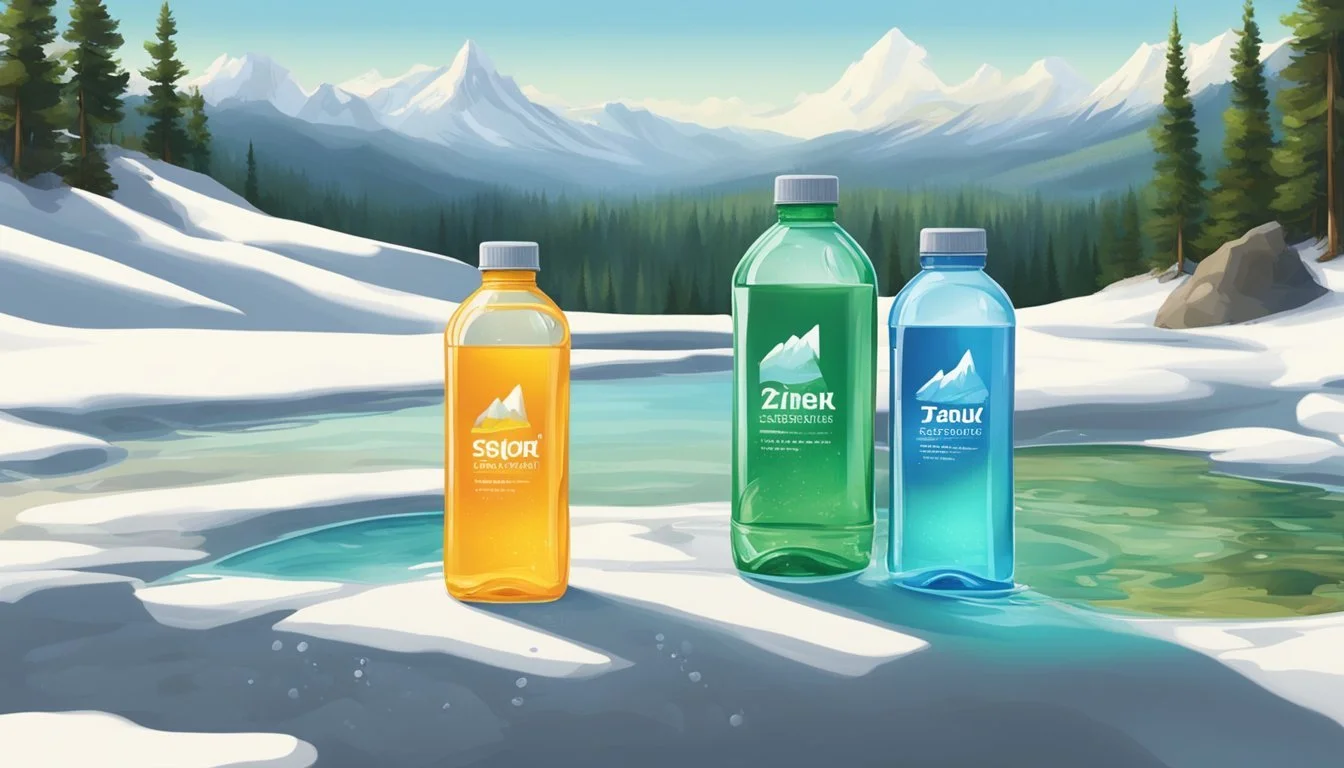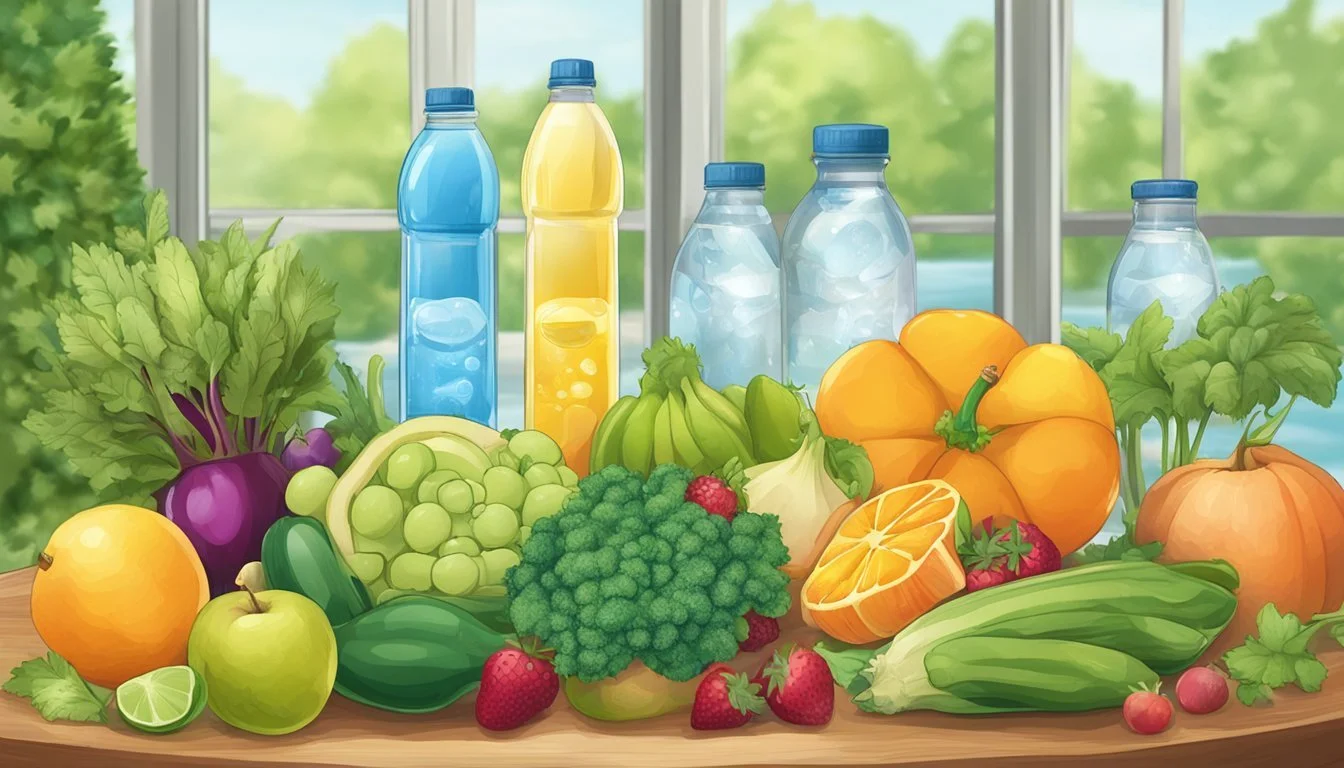Origin vs. Crystal Geyser
Bottled Water Comparison and Analysis
When it comes to selecting bottled water, consumers often weigh various factors such as taste, purity, and cost. Origin and Crystal Geyser are two popular brands that many people consider. Between the two, Origin sets itself apart with its exceptionally fresh taste and balance of minerals, making it a preferred choice for those who prioritize quality and flavor.
Crystal Geyser, on the other hand, is known for its affordability and "bottled at the source" claims. While it offers a reasonable taste and comes from natural springs, some reviews highlight that it may not stand out in comparison to higher-end brands. For many consumers, the lower price point is an attractive feature, making it a practical option for everyday hydration.
Choosing the right bottled water depends largely on individual preferences and needs. Whether one values a refined taste and mineral content or prioritizes cost-effectiveness, the decision between Origin and Crystal Geyser will ultimately come down to what the consumer values most in their bottled water experience.
Understanding Bottled Water
Bottled water comes in various types, each differing in source and treatment process. It is important to be aware of the regulations that govern bottled water to ensure safety and quality.
Types of Bottled Water
Bottled water can be categorized based on its source and treatment methods. Spring water is obtained from underground formations where water flows to the surface naturally. It often retains minerals that contribute to taste and mineral balance. It is usually bottled at the source and undergoes minimal processing.
Purified water includes water that has gone through treatment processes like distillation, deionization, or reverse osmosis. This process removes contaminants and gives the water a more neutral taste, with a typical pH close to 7. Mineral water comes from a protected underground source and contains natural minerals at consistent levels. The mineral content must remain stable and cannot be altered, providing potential health benefits.
Regulations and Standards
Bottled water is regulated to ensure it meets health and safety standards. In the United States, the Environmental Protection Agency (EPA) sets the regulations for tap water, while the Food and Drug Administration (FDA) oversees bottled water. These standards ensure contaminants like bromate and other harmful substances stay below permissible levels.
Bottled water contaminants are tested regularly to abide by strict safety protocols. Chemical, physical, and microbiological tests are conducted to ensure purity. Brands must disclose source information and comply with labeling requirements, providing transparency about the water's origin and treatment process.
Origin and Crystal Geyser Overview
This comparison examines the backgrounds and product ranges of Origin and Crystal Geyser, highlighting their water sources and key characteristics to help readers determine which brand might suit their preferences.
Company Backgrounds
Origin Water is known for sourcing water from pristine locations. The brand emphasizes sustainability and minimal processing, aiming to provide pure, natural hydration. Their water is typically sourced from natural springs, making it a favorite among consumers looking for high-quality, natural spring water.
Crystal Geyser, on the other hand, is recognized for its accessibility and affordability. It sources its water from multiple natural springs across the United States. Founded with a mission to deliver refreshing, mountain spring water, Crystal Geyser offers a product that balances taste and cost-effectiveness.
Product Range
Origin offers a limited but carefully curated range of bottled waters. Their products typically include still and sparkling options, with an emphasis on transparency about the water's origins. The packaging often highlights the water’s purity and the natural environment from which it is sourced.
Crystal Geyser provides a more extensive product range. This includes various sizes of still and sparkling water. Known for their environmentally conscious packaging, they also emphasize the natural spring sources of their water. Their variety caters to different consumer needs, from individual servings to large packs for family use.
Source and Filtration Processes
The quality of bottled water largely depends on its source and the filtration methods used. Origin and Crystal Geyser are two brands known for their distinct approaches to sourcing and purification.
Water Sources
Crystal Geyser Alpine Spring Water is sourced from multiple springs. Each location, carefully selected, ensures the water maintains its natural mineral content. These springs are chosen for their pristine environments, which contributes to the water's purity.
Origin takes a different approach by utilizing wells that tap into deep aquifers. These underground reservoirs are naturally filtered through layers of rock, which helps preserve the water's mineral composition. This method ensures a consistent and balanced taste, rich in essential minerals.
Filtration and Purification
Crystal Geyser employs a double disinfection process to ensure crystal-clear quality. The water undergoes ozonation and filtration to remove any potential contaminants while preserving its natural minerals. This process, combined with bottling at the source, ensures freshness and purity.
Origin's purification process focuses on achieving high levels of H2O purity. Advanced filtration techniques, such as reverse osmosis and carbon filtration, are used. These methods effectively eliminate impurities and provide a refined taste. The multi-step process ensures that the water remains free from contaminants, maintaining its natural essence.
Taste Profile and Mineral Content
The taste of bottled water can vary significantly, influenced by its source and mineral composition. This section explores the unique taste profiles and naturally occurring electrolytes found in Origin and Crystal Geyser waters.
Water Taste Comparison
Crystal Geyser, sourced from natural springs, is known for its crisp and clean taste. Enthusiasts often describe it as refreshing, with a slight mineral undertone. This subtle flavor makes it appealing to those who prefer a more natural water experience.
Origin, another brand of natural spring water, has a similarly clean taste but with a smoother finish. The mineral balance in Origin often lends a barely detectable sweetness, making it distinct from Crystal Geyser.
In a blind taste test, both brands frequently receive high marks, indicating their quality. While preference ultimately comes down to individual taste, both offer a palatable drinking experience that distinguishes them from more processed options like Aquafina or smartwater.
Naturally Occurring Electrolytes
Electrolytes such as calcium, magnesium, and potassium naturally occur in both Crystal Geyser and Origin spring waters. These minerals contribute not only to the taste but also to the hydration benefits.
Crystal Geyser's mineral content varies slightly depending on the specific spring it is sourced from. This can result in subtle differences in taste and mineral content across different bottles.
Origin water is noted for its consistent mineral content, providing a reliable source of electrolytes. The balanced level of calcium and magnesium in Origin supports overall hydration and muscle function, making it a solid choice for those looking for more than just plain water.
Both brands emphasize their natural spring origins, ensuring that their bottled waters maintain the integrity of their electrolyte profiles without artificial additives. This makes Crystal Geyser and Origin stand out in a market dominated by purified and distilled options.
Health and Hydration
Origin and Crystal Geyser bottled waters both aim to provide optimal health benefits and hydration. Key aspects to consider are their pH levels and their effect on health, as well as the presence of electrolytes for proper hydration.
PH Levels and Health
Crystal Geyser has a pH level of 6.9, which is close to neutral. This near-neutral pH helps in maintaining the balance of bodily fluids without disrupting natural processes. Origin may offer variations in pH, depending on the source and treatment process.
Water with a balanced pH can assist in maintaining steady internal pH levels, which is crucial for overall health. Some bottled water brands, like Essentia, emphasize their alkaline nature, boasting higher pH levels for presumed additional health benefits. However, it's important to note that the body efficiently regulates its pH naturally, reducing the necessity for alkaline water.
Hydration and Electrolytes
Proper hydration depends not just on water intake, but also on the presence of essential electrolytes. Crystal Geyser and Origin are both natural waters and generally low in added electrolytes which might be beneficial in daily consumption without additional artificial elements.
Core Hydration and Essentia are examples of bottled waters enriched with electrolytes to assist in more effective hydration. Electrolytes such as potassium, magnesium, and sodium are crucial for muscle function, nerve signaling, and fluid balance.
While both Crystal Geyser and Origin provide adequate hydration, consumers may look to electrolyte-enhanced options when engaging in intense physical activity or when seeking additional hydration support.
Environmental Impact
Evaluating the environmental impact of bottled water involves examining the sustainability practices of the companies and the packaging choices they make. Here, we look at Origin and Crystal Geyser.
Sustainability Practices
Origin prioritizes eco-friendly practices by sourcing water sustainably and ensuring minimal environmental disruption during extraction. They implement water conservation measures and support local ecosystems.
Crystal Geyser commits to reducing their carbon footprint through various green initiatives, including efficient energy use in production processes and sustainable sourcing.
Energy implications, such as those highlighted in Environmental Research Letters, emphasize the importance of reducing fossil fuel consumption in the bottled water industry, an area both brands are addressing.
Packaging Choices
Origin focuses on eco-conscious packaging options. They offer BPA-free plastic bottles and increasingly use glass bottles to reduce plastic waste. Additionally, they explore boxed water solutions to further minimize environmental impact.
Crystal Geyser also uses BPA-free materials. However, their reliance on single-use plastic bottles has raised environmental concerns. They are exploring alternatives, but their progress lags behind.
Both brands understand the necessity of eco-friendly packaging to mitigate plastic pollution. Castle Rock has set an example with its fully recyclable and biodegradable packaging, a standard both brands aim to meet.
In conclusion, both Origin and Crystal Geyser are making strides toward reducing their environmental footprint, but packaging innovations and broader sustainability initiatives will be key in determining which brand truly leads in environmental stewardship.
Consumer Preferences and Trends
Consumers are increasingly discerning about their bottled water choices, driven by factors like taste, purity, and health benefits. They often compare bottled water brands against alternatives such as tap water.
Bottled Water Consumption
Bottled water consumption has surged, becoming the preferred hydration choice for many. Grocery stores report growing shelves dedicated to different brands, driven by demand for convenience and quality. Brands like Crystal Geyser and Origin cater to consumers seeking specific taste profiles and purity assurances that tap water often lacks.
Consumers may opt for products like LIFEWTR for their enhanced mineral content and stylish packaging. The market segment varies from budget-conscious buyers to those prioritizing premium water experiences.
Evolution of Consumer Choice
Consumer choice in bottled water has evolved significantly over the years. Initially, availability and cost were the primary factors. Nowadays, factors such as water flavor, source, and added health benefits have become important.
Shoppers now read labels for details on sourcing and contaminant levels. Reports of contaminants in some brands have made consumers more vigilant. Preferences have shifted towards brands offering greater transparency and higher quality standards.
This shift has led to fierce competition among brands like Origin and Crystal Geyser, each striving to meet the sophisticated tastes and health preferences of modern shoppers.
Comparison of Popular Water Brands
The bottled water market features numerous brands, each with its distinct properties and consumer base. This comparison includes details on market competitors and brand reputation.
Market Competitors
Brands such as Dasani, Evian, Fiji, Voss, and Icelandic Glacial are prominent in the bottled water industry. Dasani, produced by Coca-Cola, is known for its purified water and added minerals for taste. Evian, on the other hand, sources its water from the French Alps, promoting a naturally balanced mineral composition.
Fiji water, with its unique aquifer source in the Fiji Islands, boasts high silica content and soft mouthfeel. Voss, from Norway, markets itself as premium artesian water in sleek, reusable bottles, while Icelandic Glacial emphasizes its glacial sourcing and eco-friendly bottling practices.
Other notable brands include Acqua Panna from Italy, known for smooth and balanced taste, Poland Spring sourced from multiple springs in Maine, and Deer Park, popular for its accessibility and reasonable pricing.
Brand Reputation and Trust
Nestlé Pure Life has faced scrutiny regarding source and quality, impacting its reputation. Dasani and Aquafina are commonly criticized for being essentially filtered tap water, which affects consumer trust. Conversely, Evian and Fiji maintain strong reputations due to their natural sources and perceived purity.
San Pellegrino and Perrier are synonymous with sparkling mineral water, regarded for their consistent quality. Voss benefits from its premium branding and distinct packaging, appealing to those seeking luxury.
Brands like Zephyrhills, Ice Mountain, Arrowhead, and Blutriton have regional followings, delivering reliable spring water options. Ethos Water, associated with Starbucks, underscores its social mission to support clean water initiatives.
These reputations can greatly influence consumer choices, with natural sourcing and transparent quality control being significant factors in brand trust and preference.
Final Assessment
The evaluation of Origin and Crystal Geyser bottled water brings several key considerations to light. Both brands have distinct characteristics that cater to different preferences and needs.
Overall Quality
Crystal Geyser is sourced from multiple natural springs and has a pH level of 6.9, which is close to neutral. Its double disinfection process maintains purity and ensures freshness. Origin Water, on the other hand, is often praised for its high mineral content and balanced pH level. These qualities make it appealing to those who prefer a slightly alkaline taste.
A water sommelier would note the texture differences. Origin Water tends to have a smooth texture with a crisp, refreshing finish. Crystal Geyser, while also refreshing, is often considered less distinct in its texture and taste nuances.
The Bottom Line
When comparing the best water to purchase, it ultimately comes down to what the individual values most. Crystal Geyser offers consistent quality and is widely available, making it a reliable choice. Origin Water, with its higher mineral content and alkaline nature, may appeal more to those seeking specific health benefits and a premium water experience.
Though both waters serve their purpose, fans of a more neutral, reliable taste might prefer Crystal Geyser. Those in search of a smoother, mineral-rich option might lean towards Origin Water.
More About Origin
Mountain Valley Spring Water vs Origin: Which Bottled Water is Better?
Origin vs Kirkland Signature: Which Bottled Water is Better?
Origin vs Richard's Rainwater: Which Bottled Water is Better?
Origin vs Whole Foods Italian Still Mineral water: Which Bottled Water is Better?
More About Crystal Geyser
Acqua Pana vs Crystal Geyser: Which Bottled Water is Better?
Alkaline88 vs Crystal Geyser: Which Bottled Water is Better?
Aqua Carpatica vs Crystal Geyser: Which Bottled Water is Better?
Boxed Water vs Crystal Geyser: Which Bottled Water is Better?
Cascade Mountain vs Crystal Geyser: Which Bottled Water is Better?
Castle Rock vs Crystal Geyser: Which Bottled Water is Better?
Core Hydration vs Crystal Geyser: Which Bottled Water is Better?
Crystal Geyser vs CBD Living: Which Bottled Water is Better?
Crystal Geyser vs Crystal Lake: Which Bottled Water is Better?
Crystal Geyser vs Essence pH10: Which Bottled Water is Better?
Crystal Geyser vs Kirkland Signature: Which Bottled Water is Better?
Crystal Geyser vs Open Water: Which Bottled Water is Better?
Crystal Geyser vs Proud Source: Which Bottled Water is Better?
Crystal Geyser vs Richard's Rainwater: Which Bottled Water is Better?
Crystal Geyser vs Simple Truth: Which Bottled Water is Better?
Crystal Geyser vs Talking Rain AQA: Which Bottled Water is Better?
Crystal Geyser vs Weird Water: Which Bottled Water is Better?
Crystal Geyser vs Whole Foods 365: Which Bottled Water is Better?
Hawaii Volcanic vs Crystal Geyser: Which Bottled Water is Better?
Hawaiian Springs vs Crystal Geyser: Which Bottled Water is Better?
Ice Mountain vs Crystal Geyser: Which Bottled Water is Better?
Icelandic Glacial vs Crystal Geyser: Which Bottled Water is Better?
Just Water vs Crystal Geyser: Which Bottled Water is Better?
Liquid Death vs Crystal Geyser: Which Bottled Water is Better?
Mountain Valley Spring Water vs Crystal Geyser: Which Bottled Water is Better?
Nestle Pure Life vs Crystal Geyser: Which Bottled Water is Better?
Poland Spring vs Crystal Geyser: Which Bottled Water is Better?
Purely Sedona vs Crystal Geyser: Which Bottled Water is Better?
San Pellegrino vs Crystal Geyser: Which Bottled Water is Better?
Smartwater vs Crystal Geyser: Which Bottled Water is Better?
Solan de Cabras vs Crystal Geyser: Which Bottled Water is Better?
Topo Chico vs Crystal Geyser: Which Bottled Water is Better?
Whole Foods Italian Still Mineral water vs Crystal Geyser: Which Bottled Water is Better?
Zephyrhills vs Crystal Geyser: Which Bottled Water is Better?






